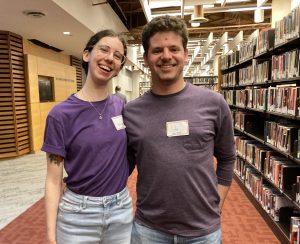Radio-Canada has defended one of its Middle East correspondents against charges by the Centre for Israel and Jewish Affairs (CIJA) that his reporting is biased against Israel.
Ombudsman Pierre Tourangeau absolved Luc Chartrand from CIJA’s accusation that he breached the network’s stated journalistic norms with his “one-sided” coverage and has a history of allowing his alleged sympathy for the Palestinians to influence his reports.
CIJA says it is disappointed with the review by Tourangeau, who previously upheld some of its complaints about the public broadcaster’s coverage of the Israeli-Palestinian conflict, and questions the independence of the ombudsman’s office.
Report “emblematic of all that is wrong with Radio-Canada coverage of the Israeli-Palestinian conflict”
In the complaint, David Ouellette, CIJA’s associate director of public affairs for Quebec, focused on Chartrand’s piece, “Guerre morale ou crime de guerre?” (Moral war or war crime?), which aired Oct. 29 on the weekly TV newsmagazine Enquête.
“This report is emblematic of all that is wrong with Radio-Canada coverage of the Palestinian conflict,” Ouellette said.
He argued that Chartrand’s examination of civilian deaths in the conflict between Hamas and Israel in Gaza in 2014 was unbalanced. In a point-by-point analysis, he said Chartrand paid scant attention to Israeli civilians targeted by Hamas and other militant Palestinian groups, leaving “the false impression that Israel was essentially conducting a war against defenceless civilians.”
Ouellette suggested Chartrand was selective in his citing of data from the report of the UN Human Rights Council and gave too much weight to interviewees sympathetic to the Palestinians or self-critical Israelis, such as the dissident ex-soldiers’ group Breaking the Silence.
Tourangeau not only clears Chartrand of wrongdoing in a 10,000-word report headed Israel: une diversité de vues que ne traduit pas le discours officiel (Israel: A Diversity of Views that the Official Line does not Convey), issued Dec. 18. He also scolds pro-Israel advocates for going too far and highlights the difficulties foreign journalists have covering the Middle East.
He upheld Enquête’s right to look solely into the Israeli military’s actions during the conflict for this feature, but cites a number of instances where Chartrand sought input from the Israeli side, including making clear that Israel was reacting to rocket fire on its residential areas from Gaza.
Tourangeau comments that the close media scrutiny Israel faces is the price of democracy. It respects freedoms that its adversaries have the advantage of being able to disregard.
CIJA turned to the ombudsman after Radio-Canada news director Jean Pelletier, editor-in-chief of Enquête, disagreed with its objections to Chartrand’s reporting.
Ouellette also argued that a novel Chartrand published last year, L’Affaire Myosotis, is evidence of what Chartrand really thinks about Israel and its “lobby” in Canada. This thriller revolves around a former Quebec journalist living in Israel who gets mixed up in the murder of a man associated with a Canadian agency promoting democracy. It turns out a Canadian pro-Israel organization is behind the death, an attempt to stymie an investigation into an alleged Israeli war crime.
Ouellette said Chartrand, who has said the book is based on his own research, “blurs the line between fact and fiction.”
While Tourangeau and Pelletier dismissed the relevance of a work of fiction to the matter, Ouellette told The CJN that the fact Radio-Canada assigned a journalist who has written such a book to investigate alleged Israeli war crimes is troubling.
Ouellette said the Radio-Canada response to this file reflects negatively on its “credibility” and “shows there are limits to the independence of the ombudsman,” after Tourangeau had “sent signals he took our complaints seriously.”
Chartrand, a veteran journalist, joined Radio-Canada in 2000, and has worked in Afghanistan and Iraq. According to the network’s website, he won the Prix Judith-Jasmin in 2010 for a report on the “pro-Israel lobby in Canada.”
In an email to The CJN and others in the Jewish community, Chartrand called the matter a “very sad misstep” (“un bien triste dérapage)” and expressed a sense of vindication. “The pressures of the plaintiff and the organization he represents on media coverage are part of the scene for a long time. Never, however, has it gone this far… ‘prosecution for one’s opinions’ – to use the term in the response of Radio-Canada’s management – and ‘guilt by association,’ the ombudsman’s term.
“I am personally saddened to see the debate brought down to this level.”






